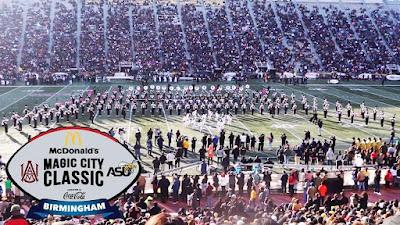
Bands perform at halftime of the Magic City Classic.
One of the first signs (at least of a sign becoming public) that college football games involving Historically Black Colleges and Universities (HBCUs) could make big money and involve odd financial arrangements involved Deion Sanders, who has been the biggest story in college sports this year at the University of Colorado and previously was head coach at Jackson State in Mississippi. Sanders realized something was wrong with the way funds were disbursed for some of Jackson State's biggest games -- and the oddities affected his pocketbook, so he complained about it publicly.
Donald Watkins, longtime attorney and sports enthusiast, has uncovered similar oddities surrounding the Magic City Classic, which pits Alabama A&M vs. Alabama State and is played every fall at Legion Field in Birmingham. (The 2023 game is set for 2:30 p.m. on Oct. 28 and will be televised on ESPN+.) Watkins has analyzed documents related to the Magic City Classic and found three major themes: (1) The event brings in millions of dollars, and it involves peculiar financial agreements that hardly are models of transparency; (2) The agreements appear to allow White-owned business entities (event managers, promoters, etc.) to come out way ahead financially, while the Black institutions that generate the big dollars are left with relative "tip money" for their efforts; and (3) Watkins calls the situation a "rip off" of the universities, one that has left alumni, students and patrons "bewildered and heartbroken" (and probably more than a little angry).
Here is one more oddity: Alabama's somnolent mainstream press, which has been known to more or less sleep through some of the state's most important stories ("Alabama has corrupt courts? Nah, our readers aren't interested in that.") is not sleeping through this one. Al.com (formerly The Birmingham News) ran multiple stories in recent days (see here and here.) and appears poised to produce more.
How did an issue that apparently became known because of Deion Sanders in Mississippi move next door to Alabama? Donald Watkins provides insight on that question under the headline "Coming Soon:The Rest of the Magic City Classic Story":
On September 27, 2022, a podcast featuring then-Jackson State University head football coach Deion Sanders by the company “Earn Your Leisure” was uploaded to YouTube.
During his interview, Coach Sanders made the following comment:
“How can we have 60,000 people in the stadium, and you told me we sold out? I check the receipts and we only sold 28,000 tickets? Y’all better find out who’s stealing because that affects my pocket.”
Sanders had a clause in his contract that stated if a Jackson State game sold more than 30,000 tickets, then he would receive 10% of the total revenue of ticket sales.
In December 2022, Coach Sanders left Jackson State to accept the head football coaching job at the University of Colorado.
Watkins did not immediately realize the Sanders podcast would introduce a major story to his home state:
At the time, I did not understand Deion Sanders’ comments. Now that I have reviewed and published the Form 990 tax returns filed by the Alabama Sports Council for 2017, 2018, 2019, 2020, and 2021, I fully understand what Coach Sanders was saying.
What is more, the Magic City Classic-related financial statements prepared by the Bruno Event Team and submitted to Alabama State University (ASU) and Alabama A&M University (AA&MU) for 2017 to 2021 have added more clarity and context to the type of concerns Sanders was expressing about the money from these Classic football games.
The Magic City Classic is the largest historically Black college football Classic game in the country. It attracts more than 60,000 attendees each year who purchase tickets to the game. The festivities kick off on the Wednesday before the game and include a press conference, luncheons, pep rally, parade, pre-game tailgate party, and halftime show.
Despite these highly profitable Magic City Classic events, the money paid out to ASU and AA&MU after the game was little more than “pocket change” or “tip” money.
Something is mighty wrong with this financial picture.
The peculiar financial picture surrounding the Magic City Classic, it turns out, is more complicated than the Deion Sanders story, Watkins reports:
In Deion Sanders’ case, he simply accused somebody at Jackson State of “stealing” his money. The university denied his allegation.
The situation with the Magic City Classic is far more complicated and insidious than Sanders’ predicament at Jackson State. Here, officials at ASU and AA&MU were grossly negligent in their oversight of the highly questionable Magic City Classic financial expenditures that were made by the Alabama Sports Council and Bruno Event Team.
Did entities and individuals affiliated with the Magic City Classic pocket money that should have flowed into the bank accounts of ASU and AA&MU?
Here is one clue that will help you answer this question:
In 2021, the Alabama Sports Council and Bruno Event Team pocketed between $1,289,378 and $1,487,258 in “management fees” for Magic City events that grossed $3,897,417 in revenues that year. These fee payments, alone, accounted for 33% to 38% of the Magic City Classic revenues in 2021. The precise percentage of the fees is difficult to determine because the financial documentation that was submitted to ASU and AA&MU is too vague, ambiguous, and incomplete to make such a determination.
The management fee payment to the Alabama Sports Council was so lucrative that it helped this nonprofit organization end the 2021 tax year with a hefty $534,333 surplus of funds.
In our next article in this exclusive investigative series of article, we will disclose who got the rest of the money from the 2021 Magic City Classic events, how they got it, and why they did not want their names revealed in the annual financial statements that were eventually provided to ASU, AA&MU, and the city of Birmingham.
We followed the money and connected the dots.
This is one hot mess!
